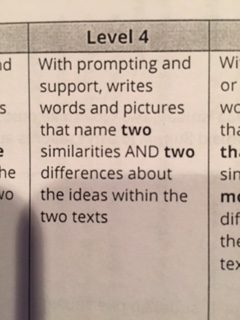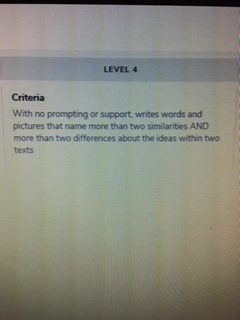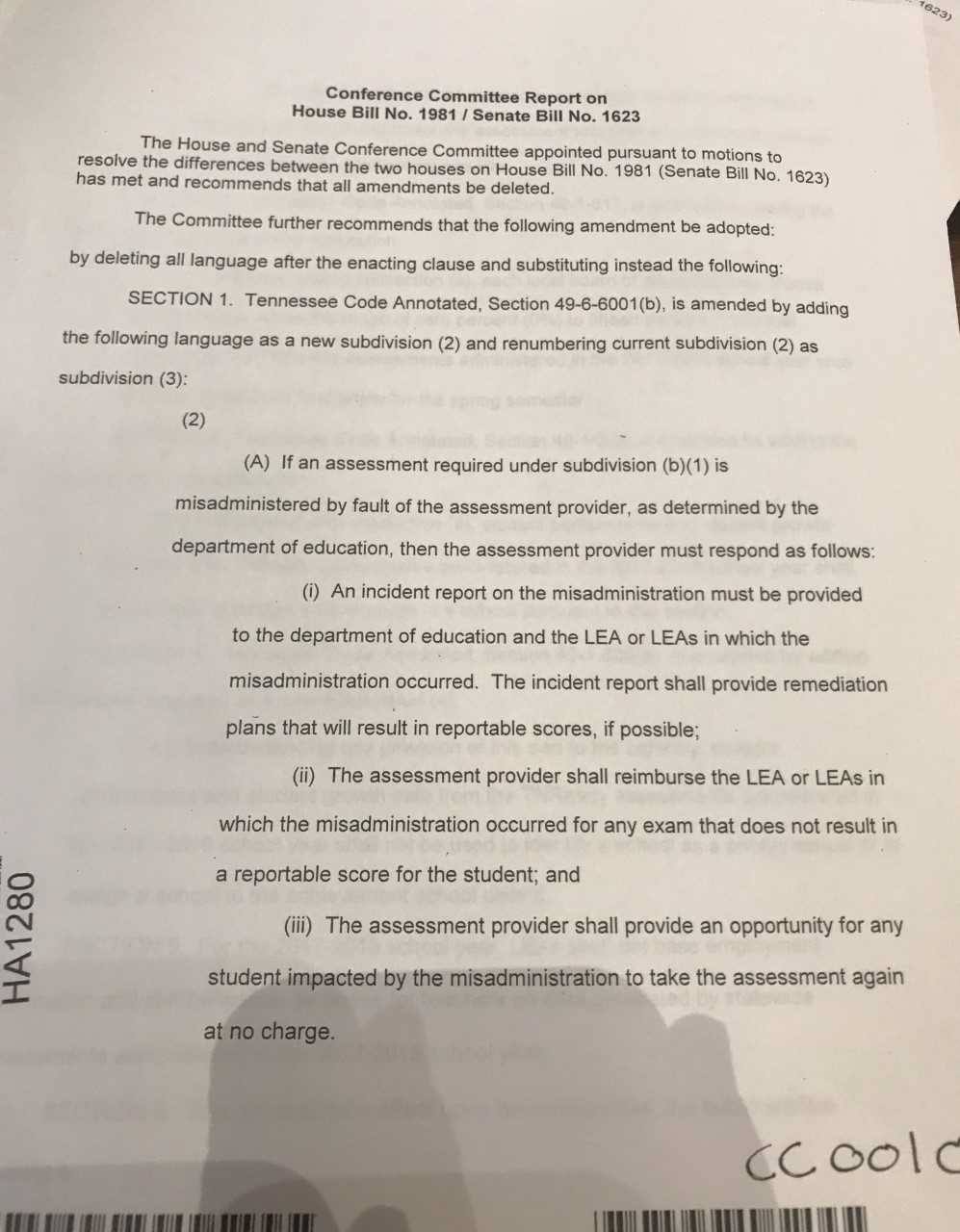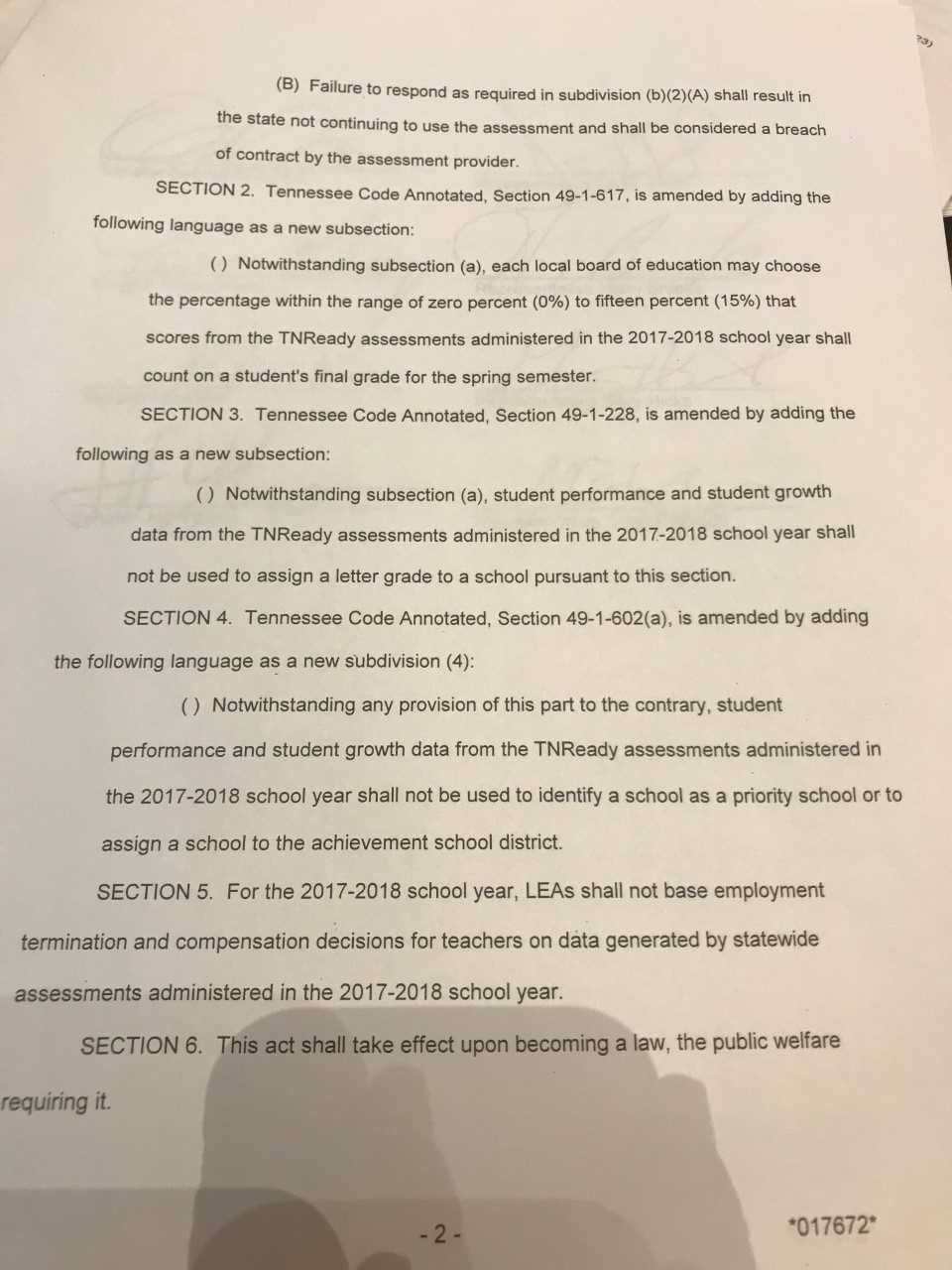As the 2017-18 school year came to a close, we reviewed the Kindergarten experience of a student named Eric and his teacher. Eric’s teacher was participating in an exciting new mandate from the Tennessee Department of Education known as a portfolio. The idea was to assess that teacher’s ability to impart knowledge by looking at her ability to move Eric and other students from Point A to Point B according to state standards.
Here’s how Eric’s year ended:
Eric has now just about completed Kindergarten. He knows no other “normal” environment for school. Complete the task, be recorded, do it again at the end of the year.
The story doesn’t note the hours his teacher spent tagging evidence and uploading it instead of (or in addition to) preparing for learning activities for her class. The story also isn’t over. The results of the first year of statewide, mandatory Kindergarten portfolios have not been recorded.
Now that the 2018-19 school year is about to start, we return to the questions posed as teachers waited on portfolio review and scoring:
How many parents are aware that their child is spending time in Kindergarten working as evidence collection specimens for a system used to assign a 1-5 number for their child’s teacher? How many know just how much instructional time is lost to this process?
Results?
Teachers were initially told by the Department of Education that results would be back by June 15th. Then, they were told it would be June 30th. Since the TN DOE has never met a deadline it could find ways to miss, June 30th came and went with no scores available to teachers. Also missing: Any clear explanation or accountability from the state.
Finally, on July 26th, the Department of Education sent a memo that included these lines teachers across the state had been waiting for:
The department is excited to announce that early grades portfolio scores (pre-K, kindergarten, and first grade) are now available. TNCompass displays the Teacher Effectiveness Indicator, which will be used as the 35 percent student growth measure in calculating the level of overall effectiveness (LOE);
Finally, after a frustrating year of jumping through hoops and losing instructional time, teachers could see the results. According to the state’s propaganda, these results would help teachers improve future instruction, so all that lost time helping kids would be worth it in the long haul. Plus, all that frustration was just because the system was new, it would get better with time.
But wait, this is the Tennessee Department of Education we’re talking about. It’s not like they have a track record of treating teachers fairly or getting evaluation and assessment right.
So, you’re saying there were problems?
Yes!
Initially, teachers noted relatively low scores. That might be expected in the first year of a new evaluation. However, closer examination revealed the low scores were the result of a grading error. For many teachers, entire sections were not reviewed. When a section was not reviewed, that section’s assessment score defaulted to a 1 – the lowest possible score. Because of this default to a low score, a teacher’s entire portfolio score was impacted.
A number of teachers shared score reports that had one or more sections that had not been reviewed.
What’s going on?
Well, it’s time for another memo from the Department of Education. Here’s what they say happened:
Portfolios are designed to demonstrate student growth across time and for standards which teachers select and are assessed through student work. In cases where evidence of student growth is significantly below expectations, these collections would receive a score of 1.
Collections could also receive a score of 1 because of a mismatch either between samples of students or between the standards that were chosen at Point A and the standards that were chosen at Point B. When the standards are mismatched in either of these ways, those portfolio collections/submissions were both flagged by a peer reviewer and autoscored as a 1. • It’s important to note that, for teachers who used all standards consistently from Point A to Point B for all three samples of students, no autoscore was generated, and the collection was scored by a peer reviewer and an expert reviewer if needed. If the difference between these two scores is more than one performance level, an expert reviewer scores the collection/submission, providing an additional level of review. If an expert reviewer scores a collection/submission, those scores are considered final.
So, a teacher who has the highest possible score on three sections and a 1 on a single section either demonstrated below expectations growth OR mismatched the collection and the standard — in other words, it was the teacher’s fault.
An analysis of department guidance by staffers at the Tennessee Education Association noted:
Based on the TDOE’s initial guidance, the cause of the debacle is a glitch in the Educopia platform that allowed a “mismatch” to occur between the two data collection points. According to TDOE, this mismatch could result in one of two ways, either from a lack of continuity in the student sample or in the standard selected. Apparently, the Educopia platform allowed erroneous mismatched data to be submitted without alerting the submitter to the apparent mismatch. When that happened, the platform proceeded to “autoscore” the mismatched collections assigning a default score of “1” rather than flagging such collections for further human review and possible correction. This procedure was not in accordance with the TDOE’s published guidance.
The Hotline reviewed all of the TDOE guidance prior to the release of the portfolio scores and it appears there was nothing to advise teachers that errant mismatched data submissions were possible, or that such mismatches could result in an autoscore of “1” for the collection. To the contrary, TDOE’s guidance repeatedly suggests all collections would be subjected to a progressive human review process in response to any discrepancies greater than one performance level. So not only does it appear there was no way teachers reasonably could have known these mismatch errors could occur, there was nothing to alert teachers to the possibility such mismatched collections could receive an autoscore of 1 without later being reviewed.
Look at that again: The Tennessee Department of Education — the same department that blamed this year’s TNReady problems on non-existent hackers and incredibly powerful dump trucks — is now blaming the Pre-K/K portfolio problems on a computer glitch. Boy, we sure do have bad luck with testing and evaluation vendors. I’m sure glad our DOE is not to blame, that’d be terrible if they were held accountable for all these crazy coincidences.
A New Approach
Thankfully, Eric has been happily enjoying his summer, blissfully ignorant of the challenges his teacher is having with all that portfolio madness. Now, though, he’s ready to go back to school and the teachers are feeling defeated as their Commissioner of Education and the department she leads continue to disrespect them.
Good news! Now, the DOE is going to provide a new portfolio vendor — one without all those pesky glitches! Here’s more on that:
One way that we plan to reduce the amount of time for portfolio development and provide enhanced support is through a partnership with Portfolium, Inc. to give educators a new e-portfolio platform: TNPortfolio. TNPortfolio will house TEAM portfolios in 2018-19, and in the future, it will support educator micro-credentialing and Work-Based Learning Student ePortfolio systems. In supporting the TEAM student growth portfolios, the platform provides functionality that will automate and improve several processes associated with portfolio development. The improved platform will allow schools to track student work samples longitudinally across multiple years. The TEAM Portfolio element of the platform will be available for teacher use on Aug. 24. On that date, you will receive an email from portfolium.com to access the system for the first time. All portfolio scoring guides and other resources will be available on that date.
YAY! A new, better vendor. Where have we heard this before? This is coming from the same Department of Education that fired Measurement, Inc. from TNReady and hired Questar. Both of them flopped. Then, in an attempt at trickery, the DOE announced Questar was being replaced by the company that owns Questar?!?
Still, there’s hope, right? I mean, this new vendor, Portfolium, is a tried and true teacher evaluation provider ready for the task, right? Well, maybe…
Here’s a bit more about the new company taking over the portfolio process — not just for Pre-K and Kindergarten teachers, but for all teachers submitting portfolios:
SAN DIEGO, July 26, 2018 /PRNewswire-PRWeb/ — The Tennessee Department of Education has awarded the contract for its TEAM student growth portfolio, student Work-Based Learning, and educator micro-credential ePortfolio systems to Portfolium, Inc., the only Student Success Network.
Portfolium’s TNPortfolio platform, which can accommodate up to 500,000 users, will allow Tennessee teachers to demonstrate the impact of classroom instruction on student growth through the TEAM student growth portfolio, allow students to demonstrate the value of the education they’re receiving through work-based learning, and allow educators to acquire and maintain micro-credentials earned through personalized professional learning. The TEAM Portfolio element of the platform will be available for teacher use starting August 24; other elements of the platform will be available for use during the 2019-20 school year.
Note that the Portfolium press release announcing the awarding of the State of Tennessee contract came on July 26th, the same day as the state’s memo to teachers regarding this year’s portfolio scores.
Who is Portfolium?
Portfolium is a startup company designed to provide college students with a way to highlight accomplishments and work samples for future employers. Yes, you read that right: The new evaluation platform is a startup company that was founded in 2013 and just three years ago, began raising a small amount of capital to launch:
Portfolium, a Web-based social network for students preparing to start their careers, said it has closed on $1.2 million in new venture funding, bringing its total funding to $2.1 million since 2013, when the San Diego-based startup was founded.
I mean, sure, this could work out great. But let’s be cautious — this is a partnership between a Department of Education with a record of failed testing ventures and a startup company seeking to expand market share. What could go wrong?
Oh, and all that time and energy teachers spent learning how to use Educopia? Gone out the window. Time to learn a new platform and see if it works.
In fact, the DOE plans to roll out training for the new platform via webinar on August 23rd. Teachers will have login credentials for Portfolium on August 24th.
Parents, you should be aware that your child’s Pre-K/K teachers may be just a tad frustrated as the year starts — it’s probably not your kid (I mean, it might be). It’s most likely the poor treatment they are receiving at the hands of the Tennessee Department of Education.
How much longer must we tell Eric’s story before policymakers in Nashville make changes that support rather than deflate our teachers?
Have a portfolio experience you’d like to share? Email me at andy@tnedreport.com

For more on education politics and policy in Tennessee, follow @TNEdReport











